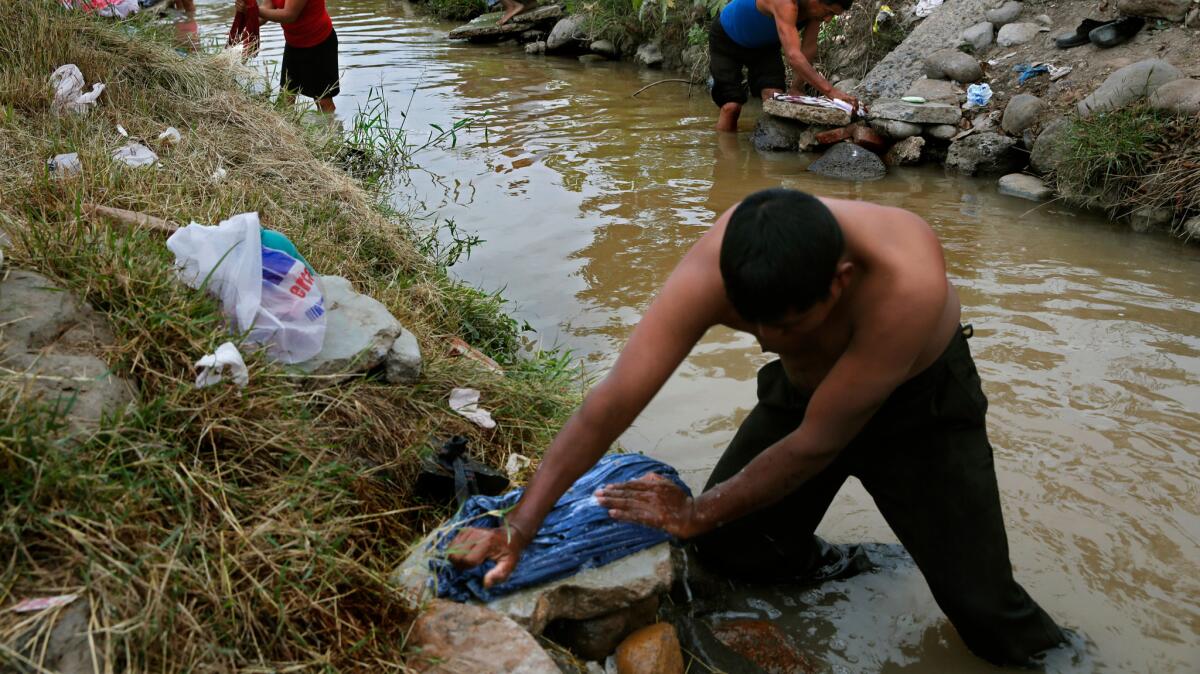Produce industry giants team up to promote responsible labor practices

- Share via
Faced with growing questions from consumers about where their food comes from, the nation’s largest produce industry groups say they are joining forces to promote responsible farm labor practices — the latest and possibly most significant attempt by the industry to rid its supply chains of abusive treatment of workers.
The move by the Produce Marketing Assn. and the United Fresh Produce Assn., still at an early stage, would be the industry’s first attempt to unite thousands of growers, distributors and retailers behind a global approach to raising worker standards.
It was prompted in part by a Los Angeles Times investigation, published in late 2014, that exposed widespread labor abuses at Mexican export farms. That series led to reform pledges by Wal-Mart and the Mexican government, and raised consumer awareness of tainted supply chains.
“We’re at a point in society where there’s just a tremendous amount of interest in where food is grown and how it’s grown,” said Tom Stenzel, chief executive of United Fresh. “It’s an evolution. Ten years ago we weren’t getting those questions from consumers.”
Stenzel said the initiative may be partly modeled on the audit-based approach adopted by the apparel and electronics industries after they came under scrutiny for harsh labor conditions.
We’re at a point in society where there’s just a tremendous amount of interest in where food is grown and how it’s grown.
— Tom Stenzel, chief executive of the United Fresh Produce Assn.
The joint committee established by the associations is co-chaired by the chairman of Sam’s Club, and Stenzel said all players in the supply chain, including labor groups, will be permitted to participate.
“If we’re going to do this right we have to listen to everybody and have an open and transparent process,” Stenzel said this week.
The effort, like other industry-led initiatives, is getting a mixed reception. Considered an important and symbolic step to address the issue, the effort’s credibility will hinge on various factors, labor groups and industry experts say, including its willingness to include certification and labor groups in the process.
“When the two major produce trade organizations come together to recognize that more needs to be done on labor issues, we applaud those efforts,” said Erik Nicholson, vice president of the United Farm Workers. “They haven’t reached out to us, which leaves us feeling a little skeptical. But we hope that happens in the near future so we can work together.”
NEWSLETTER: Get the day’s top headlines from Times Editor Davan Maharaj >>
The move comes at a time when boycott campaigns, media scrutiny and shifting consumer behavior have kept the industry under constant pressure. Supermarket shelves feature fresh produce from all over the world, creating supply chain challenges that span borders.
Boycott campaigns and other public pressure have helped the Coalition of Immokalee Workers, a Florida-based labor movement, force Taco Bell, Wal-Mart, Burger King and other companies to join its Fair Food Program, which among other things provides bonus pay for workers.
Farm laborers in Baja California are pushing a boycott campaign against Driscoll’s, the world’s largest berry distributor, despite the company’s suppliers in the region paying some of the highest farm worker wages in Mexico.
The Times’ “Product of Mexico” series exposed the harsh living and working conditions experienced by laborers at Mexican farms that supply Wal-Mart and other U.S. retailers. Many lived essentially trapped in squalid labor camps, often without beds or reliable water supplies, and had their pay illegally withheld.
The series, along with media coverage of a labor strike of pickers in Baja California, has contributed to reforms in Mexico. They include a historic agreement to raise wages in Baja California and the formation of a social responsibility trade group to improve the lives of more than 1 million laborers.
But progress has been mixed, and much resistance remains.
The industry’s challenges, experts say, are similar to the ones it faced a decade ago, when it was forced to raise food safety standards to satisfy consumers. That effort proved largely successful after growers quickly began adopting minimum standards pushed by U.S. retailers.
Tackling labor issues will be more complicated. The approaches favored in the past by the industry, which include creating globally recognized worker standards, are criticized by some for lacking enforcement mechanisms. And proposals raised by labor groups have been rejected as too costly.
See the most-read stories this hour >>
On the positive side, motivation should not be lacking. “There’s a desire for companies to get ahead of this game ... because consumers are concerned about these issues … and retailers want to be able to present to their consumers that they’re protecting their supply chain from abuse,” said Jim Prevor, a leading produce industry analyst.
Among the groups most eager to get involved are the many that conduct workplace audits and other certification services that retailers increasingly use as a way to assure consumers that their food is ethically produced.
Peter O’Driscoll, executive director of the Equitable Food Initiative, a certification program that includes laborers in workplace issues and counts Costco among its partners, said the industry’s effort sends a clear signal on responsible labor practices.
“These two organizations are making an important statement that this issue needs to be dealt with,” he said. “It puts it on the map and now we can start focusing on specifics.”
Twitter: @ricardin24
ALSO
Glendale police lieutenant sues over denial of promotion
Judge lets homeless ex-inmates fight for mental health services
Water conservation rules will ease in some parts of California, get stronger in others
More to Read
Sign up for Essential California
The most important California stories and recommendations in your inbox every morning.
You may occasionally receive promotional content from the Los Angeles Times.











